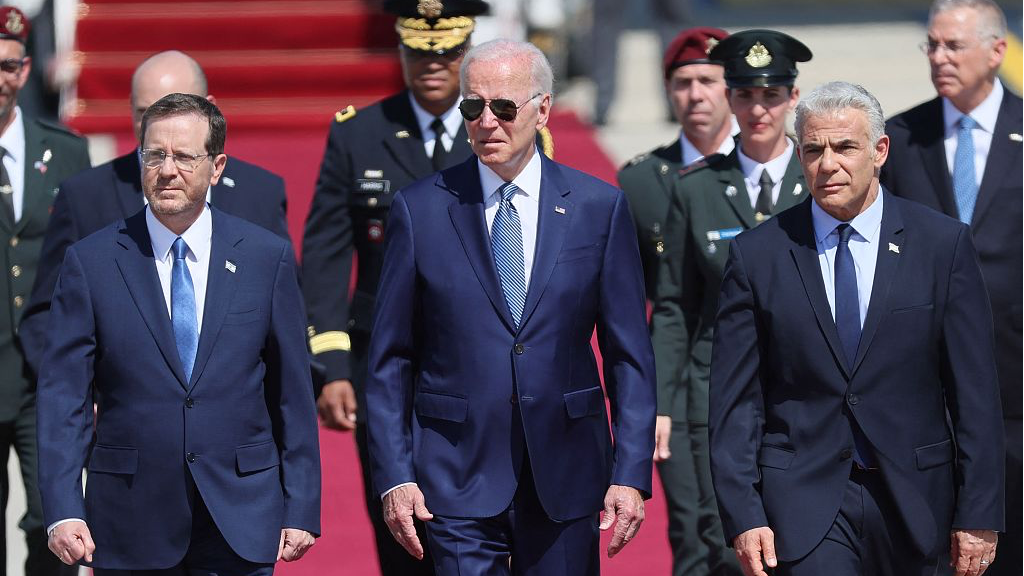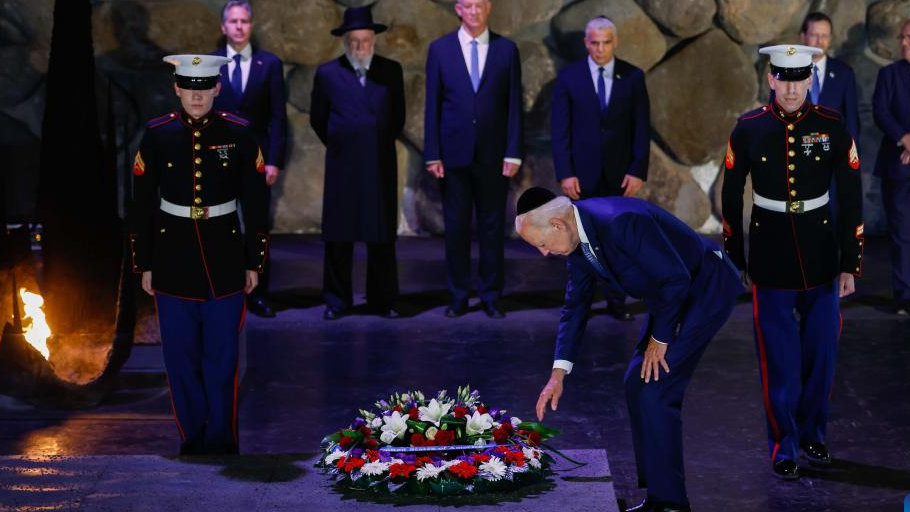
Israel's President Isaac Herzog (L) and caretaker Prime Minister Yair Lapid (R) welcome U.S. President Joe Biden (C) at Ben Gurion Airport in Lod near Tel Aviv, July 13, 2022. /CFP
Israel's President Isaac Herzog (L) and caretaker Prime Minister Yair Lapid (R) welcome U.S. President Joe Biden (C) at Ben Gurion Airport in Lod near Tel Aviv, July 13, 2022. /CFP
Editor's note: Bobby Naderi is a London-based journalist, guest contributor in print, radio and television, and documentary filmmaker. The article reflects the author's opinions, and not necessarily the views of CGTN.
On July 13, U.S. President Joe Biden travelled to the Middle East to strengthen ties with a number of countries and addressing threats posed by others. He visited Israel at the start of his regional tour.
Upon arriving in Israel, Biden reiterated America's long-held stance: "A two-state solution. That remains, in my view, the best way to ensure the future of equal measure of freedom, prosperity, and democracy for Israelis and Palestinians alike."
Speaking of his deep relationship with Israel, he said, "We'll discuss my continued support – even though I know it's not in the near term – a two-state solution." In other words, he conceded that such an outcome was elusive, while still clinging to it.
Separating the wheat from the chaff, this is not the way to achieve a just and lasting peace in regional diplomacy. It serves only to oblige the weaker party to bow to the will of the stronger, which in turn will only exacerbate and prolong the Israeli-Palestinian conflict. If this changes, it would be a silver lining to what promises to be a debacle for U.S. diplomacy and for stability of the whole region.
A glance at the regional political landscape suggests that the Biden administration's decision to rebuild relations with Palestine is a tall order, including to reintroduce peace-making into its Israeli-Palestinian toolbox. This reality has not been lost on most of the world:
Many Palestinians continue to live in occupied territories, including the West Bank with limited rights – in addition to the strangulation of those in Gaza who are not holding their breath for Biden's two-state promises to come into fruition. This makes the vague policy of the Biden administration to create a viable, independent Palestinian state seem all but illusive.
Washington is not serious about a two-state mantra, in part since it is Israel's most powerful international backer. While advocating more bouts of military muscle-flexing, the Biden administration continues to withhold the same multibillion-dollar annual military aid package to Israel. During his visit to Israel, Biden appeared to say the right things, but also touted the $4 billion in military aid delivered by his administration to Israel.
The U.S. is the biggest enabler of the settlement project, in spite of an established State Department opinion that considered them illegal. In 2019, former U.S. President Donald Trump recognized settlements in the West Bank as not violating international law. Biden is continuing Trump's policies. His administration is not ready to reverse the U.S. consulate's closure and standing up for Palestinian equal rights.

U.S. President Joe Biden (Front) attends a wreath-laying ceremony at Yad Vashem, Israel's Holocaust memorial in Jerusalem, July 13, 2022. /Xinhua
U.S. President Joe Biden (Front) attends a wreath-laying ceremony at Yad Vashem, Israel's Holocaust memorial in Jerusalem, July 13, 2022. /Xinhua
Despite his administration returning to fund the UN aid agency for Palestinian refugees, it is yet to restore full diplomatic relations with Palestine. The Palestinians call for the Biden administration to reopen the U.S. consulate in Jerusalem, which served as a de facto embassy to the Palestinians before it was halted by the Trump administration in 2019.
Washington doesn't need to recommit to a largely symbolic and moribund "peace process," seeing that Biden's trip was driven largely by power projection and a domestic political crisis linked over the prices of oil, rising food prices, and the conflict in Ukraine. In plunging the region into what has become a prolonged crisis, occurring in tandem with America's global decline, Biden inadvertently cleared the air. He smashed a rotten status quo by the U.S. "peace processing" that has served only to entrench America's power projections, while making that more difficult for a just, lasting peace between the Palestinians and Israelis.
Apparently, Biden's visit was not intended to be a reversal of American policy of antagonizing the Palestinians. Consecutive U.S. administrations did all that and more for decades. The only difference this time is that Biden is carrying the pro-Israel sword in public. This should send a strong message that the Biden presidency has shown little intention for supporting the creation of a Palestinian state alongside Israel.
Hence, Biden's first visit to Israel as president was all about resurrecting the so-called American century based on its self-interested principles. He abandoned Washington's support for a two-state solution in the short term, where in most interpretations of the concept, Palestinian residents would be treated as "second-class citizens." That marks a significant departure from the so-called U.S.'s support "for a negotiated solution."
Washington is not an honest broker and cannot be trusted to usher in foreign policy breakthroughs that would dramatically increase regional and global peace and security. Through its "bone deep" support for Israel, the Biden administration may have blocked any steps to implement the two-state solution.
More broadly still, the peace process has for many decades consisted of U.S. rejections of Palestinian self-determination and blocking any viable Palestinian state. During his cynical, pro forma stop in Israel, Biden clarified that this would remain the case while he remains the White House.
(If you want to contribute and have specific expertise, please contact us at opinions@cgtn.com. Follow @thouse_opinions on Twitter to discover the latest commentaries on CGTN Opinion Section.)

